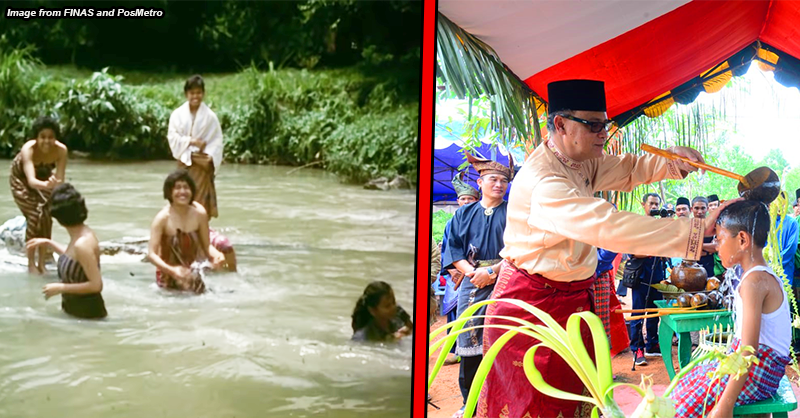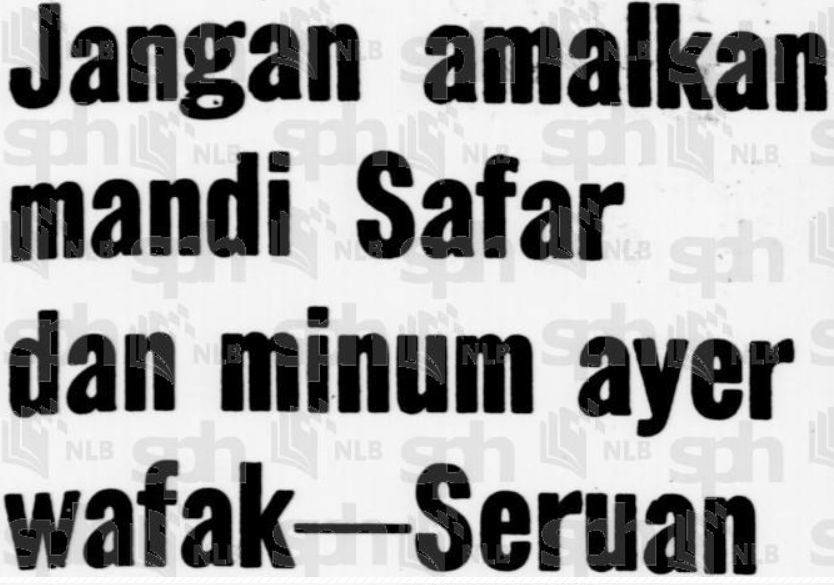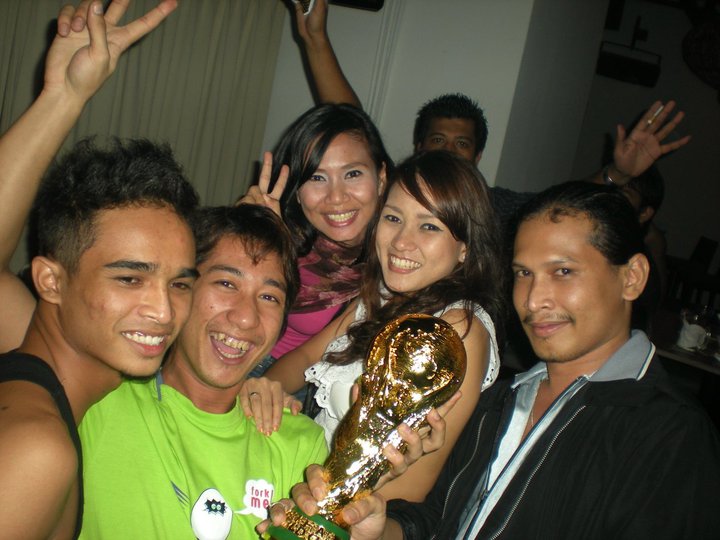The story of “Mandi Safar”, an old Malay custom commonly practiced… until it was banned.

- 1.4KShares
- Facebook1.3K
- Twitter4
- LinkedIn10
- Email13
- WhatsApp47
[Artikel ini diterjemah daripada tulisan SOSCILI. Untuk baca artikel asal dalam BM, klik sini!]
As we live in a multiracial country, Malaysia is filled with various cultures and traditions from each race. This unique blend of cultures and traditions is what makes Malaysia a colourful and vibrant country. One of these traditions include “mandi Safar”, a unique ritual that the Malays once practised… before it vanished.
Before it was deemed forbidden, the mandi Safar festival was…
Celebrated in the month of Safar to ward off… bad mojo?

According to the Dewan Bahasa dan Pustaka (DBP) dictionary, the term mandi Safar means a bathing ritual that was done at the end of “bulan Safar“, which is the second month of the Islamic calendar. The ritual was usually conducted on the last Wednesday of Safar, as people of Malay descent used to consider the month as having ‘bala’, or bad luck.
Because of this, there were other superstitions surrounding Safar, such as:
- Not getting engaged or married or travelling within the month
- Practising certain incantations to ward off bad luck
- Thinking babies born in this month are unlucky
and many more! Thus, mandi Safar is one of the rituals believed to improve one’s luck during the month.
The ritual was usually conducted near beaches or rivers and there would always be a big crowd of participants camping nearby the day before the ceremony. To entertain the crowd, performances such as Mak Yong, Ulek Mayang, Menora, wayang kulit and others were provided, giving the ritual a sort of festive vibe to it.
National Film Development Corporation Malaysia (FINAS) actually made a documentary of the event in 1962, so if you want to get a feel of what it’s like, watch this video:
In case you couldn’t watch it, a typical mandi Safar ritual starts with an Ustaz reciting a few sentences from the Al-Quran while submerging wafak, which is a ceremonial paper prepared for this ceremony. This act symbolises the start of mandi Safar for all participants.
Participants will start to bathe themselves in the waters of a river or the sea during the ritual while chanting certain incantations. Then, they scatter pieces of paper that contain words from the Al-Quran and prayers into the water. Besides bathing, some participants choose to wash themselves with a bottle filled with water and pieces of paper with excerpts from the Al-Quran. Some participants will also drink some of the water during mandi Safar as they regard it as “sacred”, which will help them to ward off bad luck.
But this is just the most common way of celebrating mandi Safar. There are other varieties of mandi Safar, and one of them is…
Puja Pantai: a festival for the sea spirits

Similar to the “mandi Safar” ritual, which was more well known in states such as Negeri Sembilan, Perak, Melaka, Sabah, and Sarawak, the Puja Pantai Festival was mostly celebrated in Terengganu and Kelantan. Although somewhat similar, both ceremonies had an entirely different goal in mind.
Puja Pantai was done as a way for the locals to appease the sea spirits. This is done by “membuang ancak”, which is when an offering made out of puffed grains, turmeric glutinous rice, roast chicken, and boiled eggs are cast off into the sea. A buffalo is often sacrificed as well in the ceremony as the fishermen believe that it will prevent the sea spirits from bothering them when they are working.
The ritual begins with bathing the buffalo with seawater before slaughtering it on the third day of the festival during Maghrib hours, which is between sunset and dusk. Afterwards, the meat of the slaughtered buffalo is cooked and served to all participants while the buffalo’s carcass is stuffed with coconut husks to make it float before it is sewn shut.
Lastly, a bomoh will place the buffalo’s carcass into a boat with some rice flour and Nipah leaves before sailing the boat away into the sea to appease the sea spirits.
These traditional rituals had once been a part of the Malayan culture, however…
Mandi Safar had been banned due to superstitious elements

A newspaper clipping from Berita Harian on 9 July 1963 shows that Islamic leaders had agreed with the decision proposed by Tan Sri Dato’ Abd. Jalil bin Haji Hassan, the Deputy Mufti of Johor, to denounce the mandi Safar ritual.
“Mandi Safar and drinking wafak water on the day has no basis in Islam and is simply nonsense… Mandi Safar has no basis in Islam and is purely supersitous.” – Tan Sri Dato’ Abd. Jalil bin Haji Hassan, translated from SOSCILI.
Since then, several Islamic leaders had called for the public to not practice mandi Safar to preserve the sanctity of the religion.
And that’s not all. When Anwar Ibrahim became the Minister of Education back in 1988, he issued a circular to all education departments to skip all related topics regarding mandi Safar when teaching the subject Tata Rakyat (now known as Pendidikan Sivik).
So due to the overall perception that the practice is nothing more than superstition, it seems like mandi Safar is officially done for now.
- 1.4KShares
- Facebook1.3K
- Twitter4
- LinkedIn10
- Email13
- WhatsApp47



